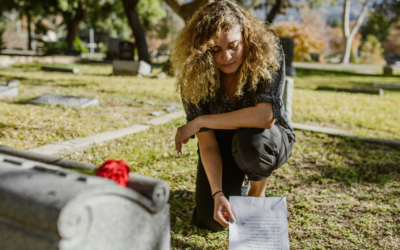The grief experienced during and after the loss of a loved one can be the most profound pain of your lifetime. While there are psychological stages of grief, not everyone experiences them the same way or in an identical order. For families, this can be exceptionally challenging because every member may respond in a different way. It’s difficult to help each other heal when you’re all embroiled in your own pain. The loss of a loved one can bring out arguments in the remaining family, some of which can be attributed to the grief itself. Sometimes it’s less painful to be angry than sad.
Coping with loss is difficult under the best of circumstances. The holiday season brings up these feelings of loss in a heightened way, even years after the death of a loved one. You’d like to enjoy the season and make new memories with the family that you still have. It can be extremely emotional to get past the empty chair at the table. The first holiday without the loved one is often the most difficult.
Tips to Cope with Loss During the Holidays
Unfortunately, there is no one size fits all solution. Grief is as unique as the individual experiencing it, so the best method to move forward for one person may not seem quite right to another. Here we’d like to offer some suggestions. Every idea may not feel right for where you are in the process, though you can revisit them for future holidays.
- Create a New Tradition. Trying to celebrate holidays in the exact same way can be hard. You’re more inclined to focus on the family member who’s missing if everything is done exactly the same way as it has been in years past. It can be good to start a new tradition that your loved one never took part in. You might choose a movie or activity to do during your family gathering. You can even choose something that honors your loved one. For instance, watching their favorite holiday movie together.
- Take a Vacation. Sometimes getting out of the setting where you’d normally enjoy the holiday can be the best way to find new joy in the season. If, for example, you’ve lost a spouse, it might be a great idea for the family to spend the holiday at a cabin or resort, away from the family home.
- Switch Up the Holiday Host. If the same family member always hosts the holidays, this might be a good opportunity to change the venue.
- Tell Stories About Your Loved One. This may be the best medicine for some of the people grieving, but there’s a chance that it will be too painful for others. If you’d like to reminisce about the loved one missing from your celebration, it can be a good way to process grief while keeping them involved in your celebration. Make sure to be respectful of the family members who find this too hard. You can offer them the opportunity to leave the room and don’t force them to be involved in that portion of the day if it upsets them.
- Choose Activities Leading Up to the Holiday. The season is more than a day or a few days. For many, the holiday season lasts the entire month and it can be hard to see joyful families when you’re coping with loss. A great way to combat the holiday blues is to find new activities to get involved in during the season. This might include new hobbies or charitable works.
- Include a Remembrance at Your Celebration. Some people like to set a place for their loved one at the table. For others, it might mean lighting a candle or putting out a picture of the loved one. You may include their favorite food or dessert in the meal or follow a specific religious tradition to honor them.
The holidays are filled with many memories, which can make the grieving process more pronounced. Depending on where you are in the journey, it can offer you opportunities to work through your grief with your family members. It can also exacerbate feelings of depression. If you’re finding it very difficult to cope with your grief, it’s important to speak to a professional who can help, such as a psychologist or counselor.




